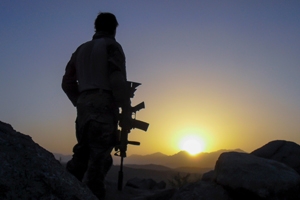Research
Blank Check

AUMF helped spawn an open-ended War on Terrorism, says SIS professor Shoon Murray in her new book.
Soon after the September 11, 2001 terrorist attacks, the nation was swept up in a combination of shock, righteous indignation, and patriotic fervor. On September 14, Congress voted on the 2001 Authorization for Use of Military Force (AUMF), which was aimed at the perpetrators of the attacks. In both houses of Congress, just one lonely soul, Rep. Barbara Lee, D-Calif., voted against the authorization. And how, you may ask, was Rep. Lee recognized for voting her conscience? She got enough death threats that she needed special Capitol Police protection. The frenzied, post 9/11 atmosphere left little room for dissent.
Yet as School of International Service professor Shoon Murray demonstrates in her new book, Rep. Lee may have been prophetic. "The statute was passed in haste, with no sense of where it would lead," Murray says in an interview. "It just took on a life of its own."
Murray's book, The Terror Authorization: The History and Politics of the 2001 AUMF, describes a law that was ill-conceived and too broadly defined. It helped spawn an open-ended War on Terrorism, with shifting conflict theaters and a rotating cast of enemies. Even as a battle-fatigued nation tries to extricate itself from Afghanistan, AUMF is still on the books as a legal justification for war-making all over the globe.
Rush to Act
Even with overwhelming support for action, Senate leaders pushed back against initial White House drafts, one which would have granted presidential authority to use force within the United States. Still, the final version of this 60-word document was all-encompassing. It authorizes the president to use force against "those nations, organizations, or persons he determines planned, authorized, committed, or aided the terrorist attacks" or "harbored such organizations or persons." Since U.S. officials had not yet definitively determined the culprits, Al Qaeda isn't even mentioned in AUMF. But in the early weeks, it would be interpreted as the right to wage war against the Taliban for harboring Al Qaeda in Afghanistan.
"By applying this legal framework to 'nations, organizations, or persons' connected with the attacks on 9/11, Congress granted significant war authority against nonstate actors without clear geographical bounds or an expiration date," Murray writes in her book.
"It allows the president to use force wherever Al Qaeda operatives reside, which is a broad expansion of presidential force that was never meant to be permanent," she says.
Executive Power
Murray says AUMF has given both the Bush and Obama administrations carte blanche to implement a number of controversial policies. NSA warrantless surveillance was initially defended using AUMF, but it was later placed under a different authority. Military commissions, drone strikes, and indefinite detention of terrorist suspects at Guantanamo Bay have all been justified by AUMF.
During the "imperial presidency" period (circa 1950 to the early 1970s), Congress was deferential to the president on foreign policy, Murray writes. Like AUMF, the 1964 Gulf of Tonkin Resolution passed with near-unanimous congressional support. Yet as the shadowy circumstances surrounding the Gulf of Tonkin incident came to light, President Lyndon Johnson was accused of gross deception. Senate Foreign Relations Committee Chairman J. William Fulbright, D-Ark. notably apologized for sponsoring the resolution, calling it a "contract based on misrepresentation."
But the Gulf of Tonkin Resolution was at least confined to one nation and one enemy, Murray says. "Even though it was a blank check, it wasn't, in some ways, as much of a blank check as this. AUMF has no geographical limitations. You can go anywhere," she explains. "It allows the president to use force in countries where we're not at war, like Yemen and Somalia."
An Emotional Issue
A major problem with AUMF, Murray notes, is that it has no sunset clause. And members of Congress have been hesitant to revisit an issue fraught with political risk. "Part of this story is the congressional abdication in war powers. I think that there's a way in which they want to give over responsibility to the president," she says.
Today's climate is different from the one immediately following 9/11. Yet Murray assumes AUMF could still pass now, and a re-opened debate could even lead to a more expansive version of the statute. "Terrorism is such an emotional issue," she says. "There's a perception that Al Qaeda is everywhere. And there is no distinction between the core Al Qaeda, who attacked the United States, and other groups, who may not be focused on the United States."
There are some indications of change, however. At a National Defense University speech in May 2013, President Obama signaled that he'd like to revise and ultimately repeal AUMF. Rep. Adam Schiff, D-Calif., who sits on the House Permanent Select Committee on Intelligence, has a bill to sunset the law. "I think what you need to do is pinpoint and debate if there is a group actually targeting the United States. Then you have an authorization that is targeted towards that and has a limited time period," Murray says.
But without deliberation on this issue, protracted conflict is almost inevitable.

